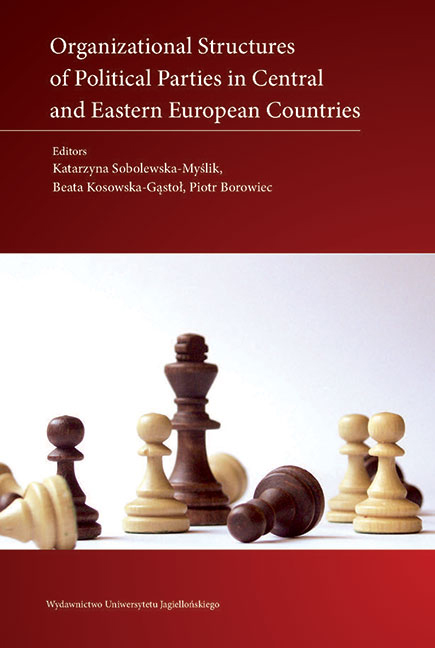Book contents
- Frontmatter
- Contents
- Preface
- Developing Party Structures in Central and Eastern Europe
- Albania: Organizations of Political Parties in Albania
- Belarus: Belarusian Political Parties: Organizational Structures and Practices
- Bosnia and Herzegovina: Organizational Structures of Political Parties in CEE Countries: A Case Study on Bosnia and Herzegovina
- Bulgaria: Organizational Structure and Trends in Bulgarian Party Politics
- Croatia: Organizational Structures of Political Parties in Croatia
- Czech Republic: Between Organizational Extremes: Czech Parties after a Political Earthquake
- Estonia: Organizational Structures of Political Parties in Estonia
- Hungary: Cut from the Same Cloth? A Comparative Analysis of Party Organizations in Hungary
- Kosovo: Structure of the Main Political Parties in Kosovo
- Latvia: Leader-Centered and Power-Hungry: Party Organizations in Latvia
- Lithuania: Organization of Political Parties: The Case of Lithuania
- Moldova: Organizational Structures of Political Parties in The Republic of Moldova
- Montenegro: Party Organization in Montenegro: Structural Resemblance Behind Political Divergence
- Poland: Structures of Polish Political Parties in the Second Decade of the 21st Century
- Romania: The Internal Organization of Romanian Political Parties
- Russia: Parties with Roots Growing Upwards: Organizational Features of Russian Political Parties
- Serbia: Organizational Structures of Political Parties in Serbia
- Slovakia: Organizational Structures of Political Parties in Slovakia: Parties not for Members
- Slovenia: Almost without Any Innovations: Organizational Structures in Slovenian Parties
- Ukraine: Shallow Party Structures in a Volatile Party System
- Comparing Organizational Structures of Political Parties in Central and Eastern European Countries
- Biographical notes about the authors
Bosnia and Herzegovina: Organizational Structures of Political Parties in CEE Countries: A Case Study on Bosnia and Herzegovina
- Frontmatter
- Contents
- Preface
- Developing Party Structures in Central and Eastern Europe
- Albania: Organizations of Political Parties in Albania
- Belarus: Belarusian Political Parties: Organizational Structures and Practices
- Bosnia and Herzegovina: Organizational Structures of Political Parties in CEE Countries: A Case Study on Bosnia and Herzegovina
- Bulgaria: Organizational Structure and Trends in Bulgarian Party Politics
- Croatia: Organizational Structures of Political Parties in Croatia
- Czech Republic: Between Organizational Extremes: Czech Parties after a Political Earthquake
- Estonia: Organizational Structures of Political Parties in Estonia
- Hungary: Cut from the Same Cloth? A Comparative Analysis of Party Organizations in Hungary
- Kosovo: Structure of the Main Political Parties in Kosovo
- Latvia: Leader-Centered and Power-Hungry: Party Organizations in Latvia
- Lithuania: Organization of Political Parties: The Case of Lithuania
- Moldova: Organizational Structures of Political Parties in The Republic of Moldova
- Montenegro: Party Organization in Montenegro: Structural Resemblance Behind Political Divergence
- Poland: Structures of Polish Political Parties in the Second Decade of the 21st Century
- Romania: The Internal Organization of Romanian Political Parties
- Russia: Parties with Roots Growing Upwards: Organizational Features of Russian Political Parties
- Serbia: Organizational Structures of Political Parties in Serbia
- Slovakia: Organizational Structures of Political Parties in Slovakia: Parties not for Members
- Slovenia: Almost without Any Innovations: Organizational Structures in Slovenian Parties
- Ukraine: Shallow Party Structures in a Volatile Party System
- Comparing Organizational Structures of Political Parties in Central and Eastern European Countries
- Biographical notes about the authors
Summary
Introduction
The emergence of political parties in Bosnia and Herzegovina began in 1906, when the first political party in BiH – the Muslim National Organization (MNO) – was established. That was period of Austro-Hungarian rule in Bosnia and Herzegovina upon the administration over Bosnia and Herzegovina was entrusted to Austria-Hungary at the Congress of Berlin in 1878. The MNO was established on 3 December, 1906, and its fi rst president was Ali-beg Firdus (Arnautović 1996: 26).
The Serb People's Independent Party (SNSS), led by Dr. Lazar Dimitrijević, was established in May 1907. Subsequently in August of 1908, yet another Muslim party was established – the Muslim People's Party (MNS), which revised its program in 1910 and changed its name to the Muslim Independent Party (Arnautović 1996: 26). The Serb National Organization (SNO) was established in October of 1907; and the Croat People's Union (HNZ) in February of 1908.
The Social Democratic Party of Bosnia and Herzegovina (SDS BiH) was established in June of 1909 and worked together with the trade union. In January of 1910, the Archbishop of Sarajevo, Josip Štadler, founded the Croat Catholic Association (HKU). These parties more or less participated in elections for the Bosnian Assembly in 1910, and the following parties won mandates: SNO (31); MNO (24); HNZ (12); and HKU (4).
Political organizing in Bosnia and Herzegovina also continued into the period of great Serbian hegemony under the Kingdom of Serbs, Croats, and Slovenes (SHS), as well as under the Kingdom of Yugoslavia. However, its form changed somewhat since dominant political parties in BiH were actually branches of big political parties from Serbia (Democratic Party, National Radical Party) and Croatia (Croatian Agricultural Party, Croatian People's Party, Croatian Republican Peasant Party). The only authentic BiH political party at the time was the Yugoslavian Muslim Organization (JMO). The Communist Party was also working successfully, but its operation was soon prohibited. In the last parliamentary elections before World War II, which were held in 1938, there were only two lists: the Government's List (JRZ) – Milan Stojadinović; and the List of Associated Opposition – Vlatko Maček (Arnautović 2009: 116–130).
- Type
- Chapter
- Information
- Organizational Structures of Political Parties in Central and Eastern European Countries , pp. 59 - 84Publisher: Jagiellonian University PressPrint publication year: 2017



